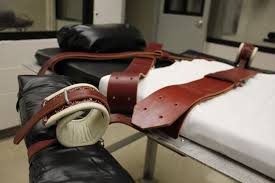Mississippi Today
Willie Jerome Manning is ‘sentenced to die for a crime he did not commit,’ his attorneys say, as they fight state efforts to set an execution date

As the state seeks to set his execution date, Willie Jerome Manning continues to maintain his innocence, challenging a double-murder conviction that his attorneys say was based on unreliable evidence, including the recanted word of a jailhouse informant and forensics the Justice Department deemed faulty.
Manning was convicted of the shooting deaths of Mississippi State University students Tiffany Miller and Jon Steckler in 1994. He has pursued appeals and post-conviction relief that have questioned the state's evidence and testimony that served as the foundation of his conviction.
“Willie Manning is sentenced to die for a crime he did not commit,” states the opening line of his Sept. 29 petition for post-conviction relief.
Last month, Attorney General Lynn Fitch asked for a stay of Manning's execution, granted in 2013, to be lifted and for his execution to be scheduled. She also is seeking an execution date for Robert Simon Jr., who has been on death row for over 30 years.
In response, Manning's attorneys from the Office of Post Conviction Counsel are seeking to dismiss the motion and allow him to continue to challenge his conviction.
His attorneys said in an Oct. 10 statement that the state hasn't responded to the petition or considered the evidence. The state said deadlines in other death penalty cases through the end of the year have prevented it from responding to Manning's petition, according to court records.
The court approved a Dec. 29 extension.
As of Monday, the Mississippi Supreme Court has not yet set an execution date for Manning.
The bodies of Miller and Steckler were discovered early Dec. 11, 1992. Steckler was shot in the back of the head and run over with Miller's car. Miller was shot in the face at close range, and she was found with one leg out of her pants and underwear and her shirt pulled up, according to court documents.
From the beginning, law enforcement struggled to come up with leads, including a theory that the murders were connected to a car break-in that happened outside of a university fraternity that Steckler was a member of. The sheriff believed the couple encountered Manning during a break-in and he forced them to drive to another location, where he killed them.
It wasn't until months after the shootings that Manning became a prime suspect. The state argued that he was caught selling items linked to Jon and taken from the burglarized car. Because there wasn't physical evidence to link him to the murders or the car burglary, Manning's attorneys argued that this urged the state to turn to jailhouse informants.
Manning, who has spent more than half of his 55 years on death row, allegedly confessed to the killings to his cousin, Earl Jordan. Jordan lied about the confession and another man, Frank Parker, who was also in jail, lied about overhearing Manning talking to another man about how he disposed of the murder weapon, according to new affidavits cited in the post-conviction petition.
His attorneys argue that the testimony of Paula Hathorn, Manning's former girlfriend, was not entirely reliable because law enforcement pressured her for her cooperation, which included receiving a cash reward of $17,500 for being a state witness at trial, according to court documents.
She also provided the state with the link to a gun believed to have killed Steckler and Miller. An FBI firearms examiner matched bullets found on the victims' bodies to ones removed from trees in Manning's yard, which she said he shot at for target practice, according to court records.
A 2013 letter from the Department of Justice said there were errors from FBI testimony about firearms and hair analysis. This led to the delay of Manning's scheduled execution to allow the testing of evidence, including a rape kit and fingernail scrapings.
The firearms testimony was an error because the science behind firearms examinations “does not permit examiner testimony that a specific gun fired a specific bullet to the exclusion of all other guns in the world”, according to court documents.
A firearms expert who worked with Manning's attorneys and commented on findings of the DOJ's 2013 letter provided affidavits that year. In another affidavit provided this year, the expert said new research and studies have shown that firearm identification and toolmark analysis are an unreliable form of forensic science, according to court records.
Manning should be granted a new trial based on the state's use of scientifically invalid testimony, his attorneys argued.
“There are already compelling reasons to question the reliability of the convictions,” the post-conviction relief petition states. “When the totality of available evidence is reviewed, there is no longer any reliable basis for Manning's convictions to stand.”
Attorneys laid out grounds for the court to grant relief, including how the state allegedly violated Manning's due process rights when it “intentionally or merely failed to disclose” evidence favorable to his defense, including the sheriff's arrangement for Jordan to cooperate in exchange for reduced charges and how the overheard conversation about Manning disposing of the weapon never happened, according to court records.
Manning has already been exonerated in another double murder case. His attorneys noted similarities in how law enforcement pursued a case against him.
In 1993, Manning was accused of killing 90-year old Alberta Jordan and her 60-year-old daughter Emmoline Jimmerson in their Starkville apartment, and convicted for their murders in 1996.
The Mississippi Supreme Court ordered a new trial in the case after determining the state violated Manning's due-process rights “by failing to provide favorable, material evidence,” according to court records. Since the state's main witness recanted his statements in sworn affidavits, then-Oktibbeha County District Attorney Forrest Allgood dismissed the charges, according to the National Registry of Exonerations.
A study by the registry found that false testimony or accusations were the single largest factor in wrongful homicide convictions between 1989 and 2012.
This article first appeared on Mississippi Today and is republished here under a Creative Commons license.
Did you miss our previous article…
https://www.biloxinewsevents.com/?p=309074
Mississippi Today
Renada Stovall, chemist and entrepreneur
Renada Stovall sat on the back deck of her rural Arkansas home one evening, contemplating life when she had a life-altering epiphany…
“I gotta get out of these woods.”
She heard it as clear as lips to her ear and as deep as the trees surrounding her property. Stovall's job as a chemist had taken her all over the country. In addition to Arkansas, there were stints in Atlanta, Dallas and Reno. But she was missing home, her parents and friends. She also knew, she needed something else to do.
“I thought, what kind of business can I start for myself,” said Stovall, as she watered herbs growing in a garden behind her south Jackson home. Some of those herbs are used in her all-natural products. “I know when I lived in Reno, Nevada, where it's very hot and very dry, there really weren't products available that worked for me, my hair, and my skin suffered. I've got a chemistry degree from Spelman College. I took the plunge and decided to create products for myself.”

In 2018, Stovall's venture led to the creation of shea butter moisturizers and natural soaps. But she didn't stop there, and in December 2022, she moved home to Mississippi and got to work, expanding her product line to include body balms and butters, and shampoos infused with avocado and palm, mango butter, coconut and olive oils.
Nadabutter, which incorporates Renada's name, came to fruition.

Stovall sells her balms and moisturizers at what she calls, “pop-up markets,” across the state during the summer. She's available via social media and also creates products depending on what of her ingredients a customer chooses. “My turmeric and honey is really popular,” Stovall added.
“The all-natural ingredients I use are great for conditioning the skin and hair. All of my products make you feel soft and luscious. The shea butter I use comes from West Africa. It's my way of networking and supporting other women. And it's my wish that other women can be inspired to be self-sufficient in starting their own businesses.”





This article first appeared on Mississippi Today and is republished here under a Creative Commons license.
Mississippi Today
On this day in 1954
MAY 17, 1954

In Brown v. Board of Education and Bolling v. Sharpe, the U.S. Supreme Court unanimously ruled that the “separate but equal” doctrine in Plessy v. Ferguson was unconstitutional under the 14th Amendment, which guaranteed equal treatment under the law.
The historic decision brought an end to federal tolerance of racial segregation, ruling in the case of student Linda Brown, who was denied admission to her local elementary school in Topeka, Kansas, because of the color of her skin.
In Mississippi, segregationist leaders called the day “Black Monday” and took up the charge of the just-created white Citizens' Council to preserve racial segregation at all costs.
This article first appeared on Mississippi Today and is republished here under a Creative Commons license.
Mississippi Today
Every university but Delta State to increase tuition this year
Every university in Mississippi is increasing tuition in the fall except for Delta State University.
The new rates were approved by the governing board of the eight universities, the Institutions of Higher Learning Board of Trustees, at its regular meeting Thursday.
The average cost of tuition in Mississippi is now $8,833 a year, a roughly 3% increase from last year. Students can expect to pay tuition ranging from $7,942 a year at Mississippi Valley State University to $10,052 a year at Mississippi State University.
In recent years, universities have cited inflation and rising insurance costs as reasons for the tuition increases. At Thursday's meeting, the board heard a presentation on how property insurance is becoming more expensive for the eight universities as Mississippi sees more tornadoes and storms with severe wind and hail.
READ MORE: Tuition increases yet again at most public universities
But it's an ongoing trend. Mississippi's public universities have steadily increased tuition since 2000, putting the cost of college increasingly out of reach for the average Mississippi family. More than half of Mississippi college students graduated with an average of $29,714 in student debt in 2020, according to the Institution for College Access and Success.
At Delta State University, the president, Daniel Ennis, announced that he will attempt to avoid tuition increases as the regional college in the Mississippi Delta undergoes drastic budget cuts in an effort to become more financially sustainable.
“We will resist tuition increases so that our most economically vulnerable students can continue to have access to the opportunities that a college degree can provide,” he wrote in a memo to faculty and staff on Monday. “We will move beyond basic survival and into a place where we have the capacity to take better advantage of our undeniable strengths.”
Delta State didn't increase tuition last year, either. Officials have been concerned the university is becoming too pricey for the students it serves.
Tuition for the 2024-25 academic year, by school:
- Alcorn State University: $8,105
- Delta State University: $8,435
- Jackson State University: $8,690
- Mississippi State University: $10,052
- Mississippi University for Women: $8,392
- Mississippi Valley State University: $7,492
- University of Mississippi: $9,612
- University of Southern Mississippi: $9,888
This article first appeared on Mississippi Today and is republished here under a Creative Commons license.
-
SuperTalk FM5 days ago
Martin Lawrence making 3 stops in Mississippi on comedy tour
-
Our Mississippi Home4 days ago
Beat the Heat with Mississippi’s Best Waterparks
-
Our Mississippi Home4 days ago
Charlie’s U-Pik: Opening Soon for the Summer Season
-
Mississippi News Video7 days ago
Local dentists offer free dental care in Amory
-
Kaiser Health News4 days ago
Medicaid ‘Unwinding’ Decried as Biased Against Disabled People
-
Mississippi News Video3 days ago
Jackson has a gang problem
-
SuperTalk FM15 hours ago
State auditor cracking down on Mississippians receiving unemployment benefits
-
Mississippi Today7 days ago
On this day in 1968









































